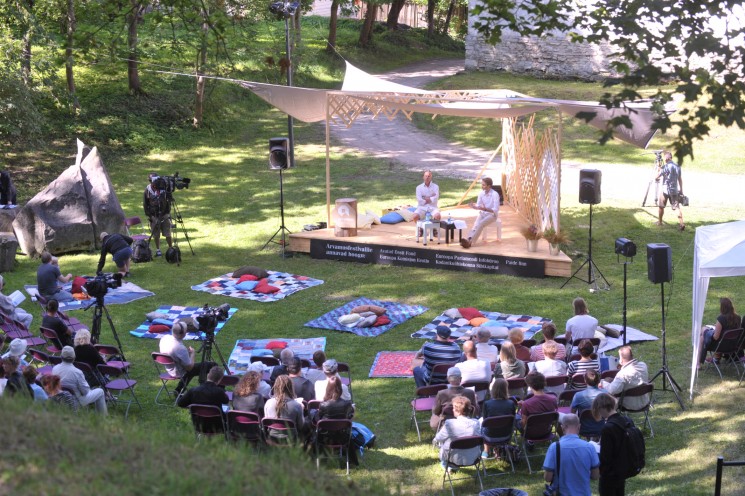
You’ve arrived at the Arvamus Festival, and you’re excited about what you’re about to see, but what should you be looking out for in particular? Allow us to guide you through some of the best talks we’ve found over the next two days.
Let’s begin on Friday at 1pm with what promises to be an amusing talk, if only because it’s with, and about, Estonian stand-up comedy – “What’s the use of start-ups for Estonia?”. The act of standing behind a microphone and trying to make an expectant audience laugh is often considered to be something inherently British or American – but as the contributors to this talk, over in Ettevõtlus Ala, show, Estonian stand-ups are to be taken seriously.
Another group wishing to be taken seriously is Keskerakond, the Centre Party. At their stage, the opposition party is hosting, on Friday at 2pm, a discussion in light of the starting of the new ETV+ channel, which is intended for Russian-speaking Estonians. The talk, “ETV+; or, what does the future hold for Estonian integration politics?” will examine the best approach to take in order to get all of Estonia involved in the political conversation.
For something a little more esoteric, head afterwards to the Mäeala or Hill Area, where you will be able to participate in a discussion about the thoughts that go on in our heads, but rarely get revealed. “Collecting Dreams About Estonia” is your chance to say exactly what you hope, or what you feel, with everyone getting together to create a better understanding and a better world for each other. That’s at 3pm on Friday, and comes highly recommended.
Following that, on Friday at 5pm, there’s a chance to solve one of Estonia’s greatest mysteries: if it to be considered a Nordic nation (and that is itself a matter for stern debate), why is it that Denmark, Norway and Sweden have all produced internationally-successful crime novelists, but not Estonia? Join the debate, “Why are there so few crime writers in Estonia?”, gather the evidence, and follow the clues, and you might be able to use your very specific set of skills to find the answer.
There are plenty of things to enjoy around Paide in the evening, but the next day, make sure you’re up bright and early, because there’s a whole programme of great things to see and do. If you’re not feeling the effects of the previous night’s celebrations, you can test your flexibility with a spot of morning yoga, at 7.30am. Follow that up with the Minutes of Silence, designed to focus the mind and allow for quiet contemplation, at 9am, and you’re ready for the day ahead, with clarity of mind.
Over at the Ekspress Meedia area, Estonia’s most inventive weekly paper hosts a talk at 11am entitled “Is Stand-Up the New Estonian Theatre?”, which is likely to continue the amusing, but involving, discussion of the previous day, and will bring a greater understanding of what brings us joy and laughter.
The same area at 2pm on Saturday brings you a chance to take part in the debate on refugees in Estonia. Should this country be welcoming people in? Are we doing enough to help the displaced? The title of the talk, “Refugees in Estonia?!” should give you an idea, with its punctuation, of the strength of the debate.
A discussion everyone needs to attend, especially if they want to understand the changing values of a modern Estonia, is the one taking place at 5pm on Saturday in VUNK innovatsiooniala, “Millennium Children and Entertainment”. For many people, it is hard to connect with those born after the year 2000, raised on social media, tablet devices, and smartphones, and expecting instant entertainment. This discussion will look at the need to change the kind of television delivered to young people in Estonia.

